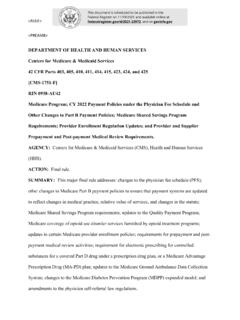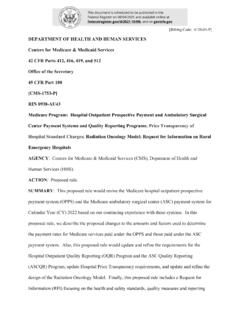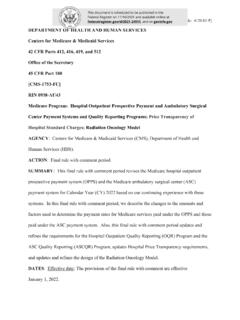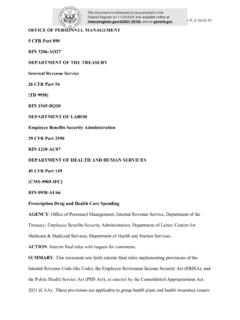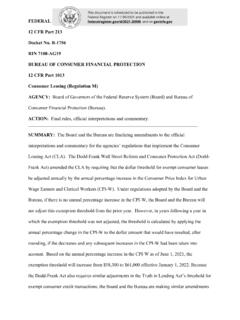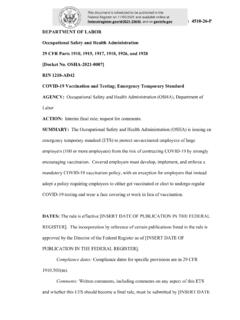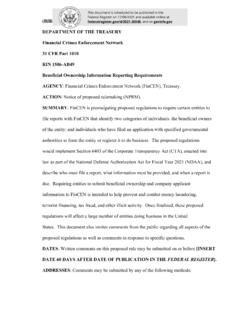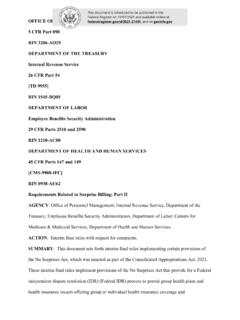Transcription of DEPARTMENT OF COMMERCE Bureau of Industry and …
1 This document is scheduled to be published in the Federal Register on 03/08/2022 and available online at , and on Billing Code: 3510-33-P. DEPARTMENT OF COMMERCE . Bureau of Industry and Security 15 CFR Parts 738 and 746. [Docket No. 220303-0068]. RIN 0694-AI76. Expansion of Sanctions Against the Russian Industry Sector Under the Export Administration Regulations (EAR). AGENCY: Bureau of Industry and Security, DEPARTMENT of COMMERCE . ACTION: Final rule. SUMMARY: In response to the Russian Federation's (Russia's) further invasion of Ukraine, the DEPARTMENT of COMMERCE is expanding the existing sanctions against the Russian Industry sector by adding a new prohibition under the Export Administration Regulations (EAR) that targets the oil refinery sector in Russia.
2 These new export controls will further limit revenue that could support the military capabilities of Russia. DATES: This rule is effective on [INSERT DATE OF FILING FOR PUBLIC INSPECTION]. FOR FURTHER INFORMATION CONTACT: For questions on this final rule, contact Eileen Albanese, Director, Office of National Security and Technology Transfer Controls, Bureau of Industry and Security, DEPARTMENT of COMMERCE , Phone: (202) 482-0092, Fax: (202). 482-482-3355, E-mail: For emails, include Russia Industry Sector Sanctions Expansion in the subject line. SUPPLEMENTARY INFORMATION: I. Background In response to Russia's February 2022 further invasion of Ukraine, the Bureau of Industry and Security (BIS) imposed extensive sanctions on Russia under the Export Administration Regulations (15 CFR parts 730 774) (EAR) as part of the final rule, Implementation of Sanctions Against Russia Under the Export Administration Regulations (EAR), effective February 24, 2022 ( Russia Sanctions rule ).
3 1 As described in the Russia Sanctions rule's preamble, Russia's invasion of Ukraine flagrantly violates international law, is contrary to national security and foreign policy interests, and undermines global order, peace, and security, and consequently necessitated the imposition of stringent sanctions. The export control measures implemented in this final rule build upon the policy objectives set forth in the Russian Sanctions rule by further restricting Russia's access to items that it needs to support its military capabilities. The changes made by this rule are intended to further limit the Russian oil sector by restricting the export, reexport and transfer (in-country) of additional items needed for oil refining. Sale of gasoline produced from Russian oil is a major source of revenue for Russia.
4 Limiting the export, reexport and transfer (in-country) of critical oil refining equipment will consequently reduce Russia's ability to generate revenue that the country needs to support its military capabilities. As described below, this rule expands the scope of the sanctions against the Russian Industry sector that were originally added to the EAR in August 2014 in response to Russia's 2014 destabilizing conduct in Ukraine and occupation of the Crimea region of Ukraine. See 79. FR 45675 (Aug. 6, 2014). The export controls in this final rule target the oil refinery sector in Russia. These new export controls under the EAR, implemented in parallel with similarly 1 87 FR 12226 (March 3, 2022). stringent measures by partner and allied countries, will further limit sources of revenue that could support the military capabilities of Russia.
5 II. Overview of New Controls This final rule amends part 746 of the EAR (Embargoes and Other Special Controls) to expand the scope of the Russian Industry sector sanctions by adding a new general prohibition that will apply to additional Harmonized Tariff Schedule (HTS)-6 codes and Schedule B numbers for all exports, reexports, and transfers (in-country) to or within Russia. III. Amendments to the Export Administration Regulations (EAR). A. Expansion of Russian Industry Sanctions and conforming change. 1. Expansion of Russian Industry sector sanctions by adding a new prohibition. Under of the EAR (Russian Industry sector sanctions), this final rule revises paragraph (a) (License requirement) to expand the scope of the general prohibition under paragraph (a)(1).
6 Prior to this rule, this general prohibition applied to the export, reexport or transfer (in-country) of certain items in situations where a person had knowledge, for purposes of the EAR, that the item would be used directly or indirectly in Russia's energy sector for exploration or production from deepwater, Arctic offshore, or shale projects in Russia that have the potential to produce oil or gas, or where a person was unable to determine whether the item would be used in such projects in Russia. This final rule adds a new paragraph (a)(1)(ii) to expand the scope of the general prohibition under this section by imposing an additional license requirement for exports, reexports or transfers (in-country) of any item subject to the EAR listed in new supplement no.
7 4 to part 746. to and within Russia. Unlike the existing prohibition (reordered to appear in new paragraph (a)(1)(i)), the prohibition under new paragraph (a)(1)(ii) does not include a knowledge . requirement. This final rule also adds new paragraph (a)(1)(iii) to provide cross-references to other EAR license requirements for Russia and guidance for submitting license applications required pursuant to this section. Additionally, this final rule adds new supplement no. 4 to part 746 . HTS Codes and Schedule B Numbers that Require a License for Export, Reexport, and Transfer (in-country) to or within Russia pursuant to (a)(1)(ii), to identify the items by HTS code and Schedule B number that will be subject to the prohibition under paragraph (a)(1)(ii).
8 Supplement no. 4 will include four columns consisting of the HTS Code, HTS Description, Schedule B and Schedule B Description to assist exporters, reexporters, and transferors to identify the products in this supplement. There is no difference in the scope of products identified in the supplement by HTS-6 code and HTS description or by the Schedule B number and Schedule B description. The inclusion of both the HTS-6 codes and Schedule B numbers will assist exporters, reexporters, and transferors if they have difficulty in identifying a product based on either the HTS codes or Schedule B numbers alone. Under paragraph (b) (Licensing policy), this final rule adds new paragraph (b)(1) for the text that appeared in paragraph (b) prior to this final rule, which will specify the licensing policy for the license requirements under new paragraph (a)(1)(i).
9 This rule changes the license review policy that appeared in paragraph (b) which is now paragraph (b)(1) in this rule from a presumption of denial to the more restrictive policy of denial. This change in the license review policy is made to harmonize with the license review policy in new paragraph (b)(2) for the license requirements under paragraph (a)(1)(ii), as well as with the license review policies that have been adopted for other sanctions against Russia. This final rule adds a new paragraph (b)(2) to add the review policy, a policy of denial, that will be applicable to applications that fall within the scope of paragraph (a)(1)(ii). However, for both the license review policies in paragraphs (a)(1)(i) and (ii), this rule specifies that applications for export, reexport, or transfer (in-country) of items that may be necessary for health and safety reasons will be reviewed under a case-by case license review policy.
10 This inclusion of this case-by-case license review policy is consistent with other parts of the Russia Sanctions rule, in particular, the inclusion of a case-by- case license review policy related to safety of flight and maritime safety. BIS also notes that license applicants may request emergency processing of license applications by following the procedures identified in (h) (Emergency processing) of the EAR. Under (h), BIS. will expedite its evaluation, and attempt to expedite the evaluations of other government agencies, of a license application when, in BIS's judgment, the circumstances justify emergency processing. BIS estimates that new license requirements under (a)(1)(ii) will result in an additional 20 license applications being submitted to BIS annually.
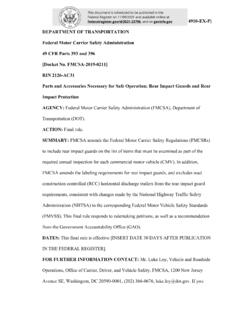
![DEPARTMENT OF COMMERCE [Docket No. 211213-0259] …](/cache/preview/2/2/6/7/7/8/1/2/thumb-22677812e7ac1183a3a0b47ebea8a362.jpg)
